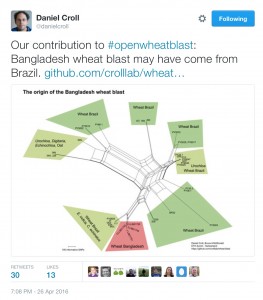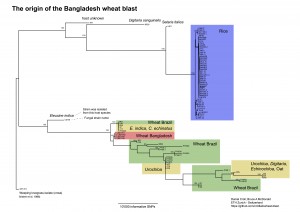April 26, 2016. Daniel Croll and Bruce McDonald, ETH Zurich, post in Github an analysis on the origin of wheat blast in Bangladesh based on the Open Wheat Blast data. They conclude that the pathogen was most likely introduced from South America.
April 27, 2016. Ewen Callaway publishes an article in Nature News “Scientists race to determine origin of Bangladesh outbreak, which they warn could spread farther afield.” The article was updated following Daniel Croll’s report.
April 27, 2016. “The plant-pathology community has a responsibility to allow data to be used to combat diseases happening now” writes Nick Talbot.
April 28, 2016. Open Wheat Blast Timeline posted. Time from field collection to genome analysis: 6 weeks.
April 30, 2016. Castroagudin et al. “Wheat blast disease caused by Pyricularia graminis–tritici sp. nov.” preprint posted in bioRxiv. The authors conducted phylogenetic analyses based on 10 housekeeping genes and discovered that the wheat blast isolates are distinct and more diverse than rice blast isolates. The paper has also some very useful data on the host range of the different isolates. Their proposal to divide wheat blast isolates into two taxa immediately generates discussion on Twitter with posts by @talbotlabexeter, @namraf64, and @danielcroll.
May 1, 2016. Sophien Kamoun posts a review of Castroagudin et al. on bioRxiv. The main point is whether the division of wheat blast isolates into two distinct taxa is justified given that all wheat blast isolates cluster together in the more updated analysis of Croll and McDonald, Github. Kamoun writes “Will the two taxa proposed here for the wheat blast isolates remain valid when genome-wide analyses are performed?”
May 1, 206. Bruce McDonald provides background information about the wheat blast outbreak in Bangladesh. He makes an excellent case about rapid dissemination of information: “If this were a human disease, like Ebola or Zika, and we were medical researchers who discovered a likely source of infection, we would be compelled to notify immediately all of the people who may have been in contact with the source of infection in order to prevent its further spread.” He calls for increased surveillance efforts in Asian countries that have imported wheat from South America.


